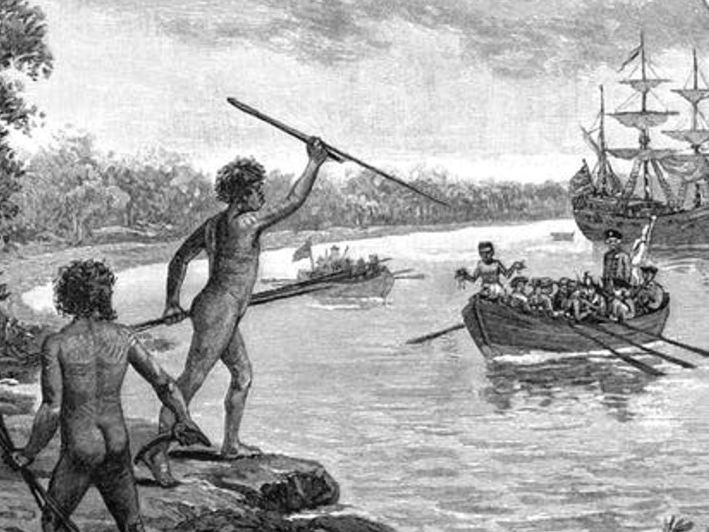Kathryn Diss and Adrian Wilson, ‘Emotional moment’ as spears taken by Captain Cook are returned to Indigenous community, from ABC Europe correspondent, Kathryn Diss, and Adrian Wilson, in Cambridge, England, 23 April 2024.
Read more: https://www.abc.net.au/news/2024-04-23/gweagal-spears-captain-cook-took-handed-to-indigenous-community/103756446
See also Ben Lewis’s story on SBS News, 24 April 2024:
https://www.sbs.com.au/news/podcast-episode/survivors-from-a-moment-in-time-ancient-spears-handed-back/0i85urkau
On 29 April 1770, the HMS Endeavour sailed into Kamay (Botany Bay), in today’s Sydney, New South Wales. This was the place where the ship’s captain, then Lieutenant, James Cook and some of his crew first set foot on Australian soil. Two warriors of the Gweagal clan of the Dharawal nation tried to scare off the British landing party with stones and spears. Determined to land, Cook fired shots at the men, wounding one before the warriors left.

A sketch of two Aboriginal men with spears as Cook and his party prepare to land at Botany Bay, 29 April 1770 (Wikimedia)
To many Australians Cook’s action and the warriors’ response is the first known aggression between the British and First People on the Australian mainland. The National Museum of Australia has been working closely with the La Peruse Local Aboriginal land Council and the Gudjaga Foundation to bring this ‘foundational’ story to the public’s attention and to educate school children about the incident. Read more here: https://www.nma.gov.au/exhibitions/endeavour-voyage/kamay-botany-bay
While some overseas museums and other repositories have returned human remains and artefacts to other Australian First Nations in recent times, the return of four of the between 40 and 50 spears Cook and party stole from an Aboriginal camp at Kamay in 1770, hopefully marks a change for the better.

